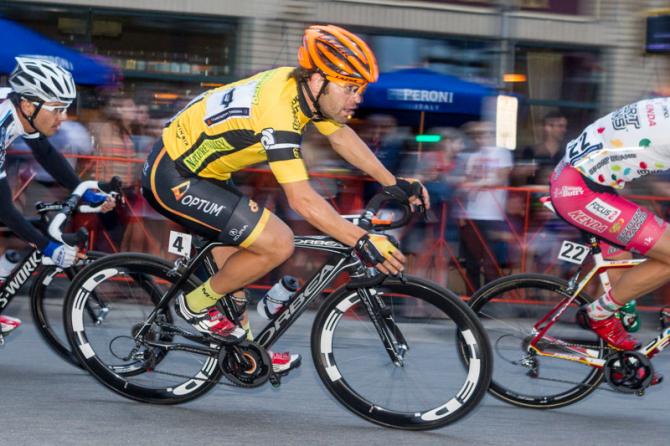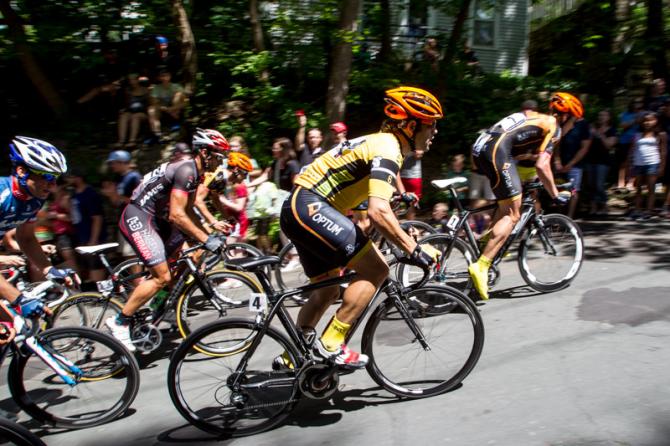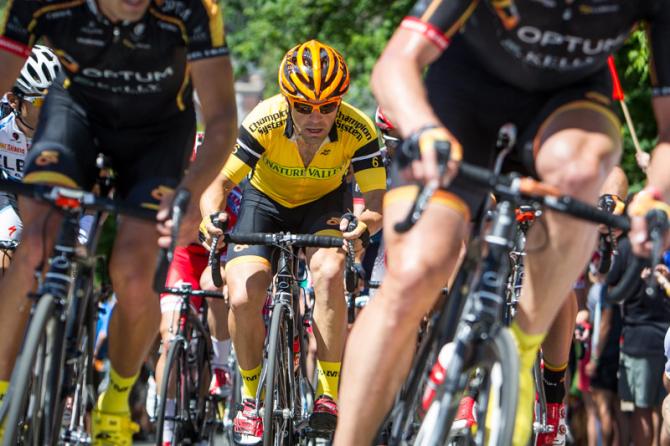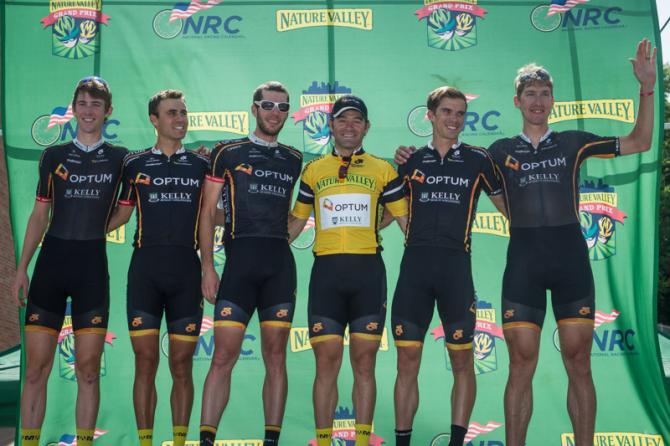Friedman returns to top form with Nature Valley Grand Prix victory
Payback for team's support through health issues




When Mike Friedman crossed the finish line of the Stillwater Criterium at the Nature Valley Grand Prix in second place, securing the overall win at the six-stage National Racing Calendar (NRC) event, it marked his first major victory since he won the general classification at the Tour of Korea in 2010. It also signaled a return to top form for the rider who has had to come back from two major health issues that temporarily stalled his career.
"I've certainly had my fare share of obstacles," Friedman, 30, told Cyclingnews this week from his home in Superior, Colorado. "It's definitely been a roller coaster ride. There's no doubt."
The third-year Optum p/b Kelly Benefit Strategies rider relied on three second-place finishes, a third and two fifth-place spots to win the six-stage race last week – the third consecutive year his Minnesota-based team has won the race it considers its home event. The result was a far cry from just a year earlier, when Friedman crashed in a corner of the stage 2 St. Paul Criterium and abandoned the race with a mild concussion.
The multi-time national champion and Olympian from Pennsylvania has been plying the pedals for more than a decade, finding initial success on the track in collegiate cycling for Penn State and then signing with Jonathan Vaughters' TIAA-CREF team in 2006.
But Friedman's move to the professional ranks came to a quick halt that same season when a blood clot lodged in his lung, leading to a diagnosis of Factor 5 Leiden, a genetic blood disorder present in about five percent of the population that causes the blood to clot more quickly than normal. The diagnosis kept Friedman out of racing for the first half of the 2007 season, but he says it was a blessing in disguise.
"I actually feel safer now as a rider and competitor traveling around," Friedman said. "Without having that blood clot early in my career, I wouldn't have known that I'm at a high risk for it. And this lifestyle is pretty risky for it – being dehydrated, flying a lot, riding in cramped vans with luggage or having a few beers after a race and then traveling. Those are huge risks for getting a blood clot. These clots could have killed me."
Despite the setback, Vaughters and USA Cycling stood by Friedman, keeping him on the team and allowing him to remain at the Olympic Training Center while recovering. Friedman continued to race for Vaughters' Garmin-sponsored ProTour teams through 2009, competing in some of the most prestigious races in the world, but the team didn't have a spot for him in 2010. Aside from needing to find a new team for the next season, Friedman had to get past the feeling of rejection he felt from Vaughters, who he had become friends with since their early days together.
Get The Leadout Newsletter
The latest race content, interviews, features, reviews and expert buying guides, direct to your inbox!
"It was a hard transition for me, when we were going through that and he had to basically let me go," Friedman said. "I didn't understand how he could do that, how he could turn that on and off. It was a really hard lesson for me to learn, but it's a business and that's the way it goes."
Friedman signed with UCI Continental team Jelly Belly for 2010 and found some early season success in Asia, where he took his overall win in the Korean tour. Friedman's success led to an offer to ride the 2011 season for Kelly Benefit Strategies, and he made the jump. But his first season with the new team also hit a speed bump.
"I can remember having slow, incremental deficiencies with my left leg versus my right until it was so bad I literally couldn't pedal correctly with it," Friedman told Cyclingnews at the time. "At first it was intermittent, sometimes it was good, sometimes it was significantly more sore. It would feel heavy like I had to think about kicking it over and pulling up, it would cramp first, it would fatigue almost immediately at Tour of California, especially in the drops or aero bars, basically I couldn't do what I used to be able to."
Doctors discovered a kink in Friedman's iliac artery, the main line for oxygenated blood traveling to his legs. The problem had built up slowly over the years, robbing his pedal stroke of power until he could hardly pedal at times. Friedman's blood disorder complicated the surgery to repair the kinked artery, so the procedure and subsequent recovery ended his 2011 campaign. But the team stuck by the rider, and he was back in 2012.
"They believed in me, were patient and let me work through it," Friedman said. "On the same note, when I had my pulmonary embolism while I was at Slipstream, Jonathan Vaughters also stuck behind me. So I've had people who have trusted me and had faith.
"That makes me feel fantastic, that whatever I'm doing is the right thing," he continued. "Because they could so easily say, 'We can't support you.' And honestly that would be a better business model, because they could go hire someone else. But they stuck by me, and I plan on sticking by them. Cycling is so cut-throat, but then you find these gems that stand by you, and that's important."
Friedman rewarded the team's confidence in him with a handful of top-10 finishes in 2012 at races in the US, Asia and Europe, including fourth in France's Grand Prix de la Somme. But his win in Minnesota last week clearly tops the list of recent results, and Friedman was anxious to put the victory in his team's trophy case.
"There's so much that I was thinking about going into the final stage because I didn't want to screw it up," he said. "I could almost get emotional thinking about all of the stuff that I have overcome, always plodding forward, always just getting up and going out and riding and analyzing the things I'm doing right or wrong, but then to have it come bear fruit."
And on the final day in Minnesota – on a course that featured 21 climbs up Chilkoot Hill and its 17 percent grades – Friedman succeeded, he said, by trusting in the team that had put so much faith in him.
"I was freaking out," he said of the night before the Stillwater stage in Minnesota. "I woke up at like 3:30 in the morning and I was analyzing, like OK, this could happen or this could happen. All the different scenarios were playing out in my head. I talked with Jesse Anthony that morning and I talked with Tom Zirbel at the race, and he said, 'Look, man. Just trust us. Here's what we're going to do. Just have faith in us.'"
Growing up in Missoula, Montana, Pat competed in his first bike race in 1985 at Flathead Lake. He studied English and journalism at the University of Oregon and has covered North American cycling extensively since 2009, as well as racing and teams in Europe and South America. Pat currently lives in the US outside of Portland, Oregon, with his imaginary dog Rusty.